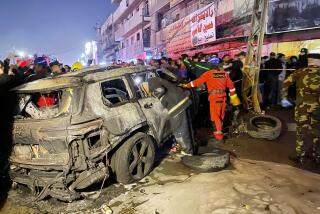Iraq’s Maliki assails U.S. commander
Iraqi Prime Minister Nouri Maliki warned in comments broadcast Friday that the top U.S. commander in Iraq “had risked his position” by suggesting that Iran tried to bribe Iraqi lawmakers to oppose a security agreement with the United States.
Maliki’s remarks were aired on state television as he convened the leaders of Iraq’s political blocs to review the security agreement that would sanction U.S. troops staying in Iraq after a United Nations mandate expires Dec. 31.
The meeting of leaders, known as the Political Council for National Security, ended with plans to meet again Sunday, according to Haidar Abadi, a member of parliament from Maliki’s Islamic Dawa Party. Abadi said he did not expect the discussions to move quickly after Friday’s session.
U.S. Army Gen. Ray Odierno, who took command of U.S. forces last month, told the Washington Post in an interview published Monday that American intelligence reports alleged that Iran had attempted to bribe Iraqi lawmakers to sabotage the agreement.
The comments, which drew the ire of Iraqi politicians all week, brought an angry retort from Maliki.
“The American commander risked his position when he talked about this issue and in this manner. He has regretfully made relations complex,” Maliki said in remarks made to Kuwaiti journalists on Thursday and aired Friday. “The man is known for his goodness, but [I don’t know] how he made such a statement, and there is no reality in this subject. The parliament does not take any bribes, neither from Iran or any other party. This is regretful.”
The Iraqi government and its three-member presidency council had already issued statements condemning the remarks. The U.S. military had also taken the step of reiterating that Odierno was criticizing Iran and not Iraqi lawmakers.
The dispute revealed the tensions festering in U.S.-Iraqi relations five years after American-led forces toppled dictator Saddam Hussein.
Shiite Muslim lawmakers have acknowledged that there are some within Maliki’s ruling Shiite coalition who are opposed to a long-term alliance with the United States. It remains unclear whether the prime minister even wants a deal. The agreement, in a country with a bitter history regarding foreign powers, has the potential to tar its proponents as serving American interests.
The agreement as currently written says that all U.S. forces will withdraw from Iraq by the end of 2011 unless Baghdad requests otherwise. U.S. troops would relocate to bases outside major cities by the end of June 2009, unless Iraq asked U.S. forces to stay in certain population centers.
The agreement’s stipulation granting immunity for U.S. soldiers from Iraqi courts remains the most controversial issue for Iraqis. In most cases, U.S. forces are exempt from Iraqi law while on combat missions or on bases. However, under the accord, if a soldier commits an act that could be considered a premeditated crime or gross negligence against an Iraqi, U.S. and Iraqi sides would convene a committee to decide whether the case should be referred to an Iraqi court, a senior Iraqi official has said.
Maliki, who has pledged to take the agreement to parliament for approval when there is consensus among political blocs, emphasized that the deal was far from certain.
“Today we are at the end of October and are not sure whether it’s going to be finalized or not. We would like it if such decisions were to be made in a fast manner, but the machinations of such things take precedence,” he told the Kuwaiti journalists. After obtaining support from the political blocs, Maliki would submit the agreement to the Cabinet and then to parliament for a vote.
“If I was one of the people who assumed that it would move softly and quickly, I would be disappointed,” said Abadi, the lawmaker. “Everyone is keeping their cards close to their chests. They think it’s too early to declare their position.”
A major opponent of the agreement is Shiite cleric Muqtada Sadr, a Maliki rival who is planning a protest in Baghdad today against the presence of U.S. forces in Iraq.
In other developments, a bomb exploded in east Baghdad’s Shaab district, killing three people as they left a Shiite mosque, police said.
--
More to Read
Start your day right
Sign up for Essential California for news, features and recommendations from the L.A. Times and beyond in your inbox six days a week.
You may occasionally receive promotional content from the Los Angeles Times.






